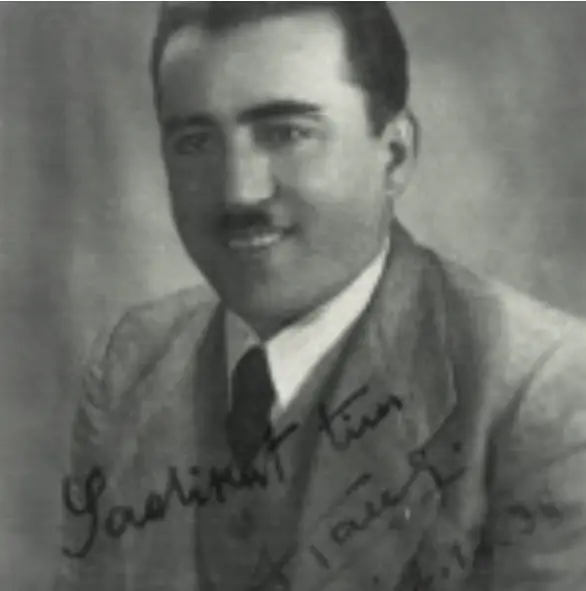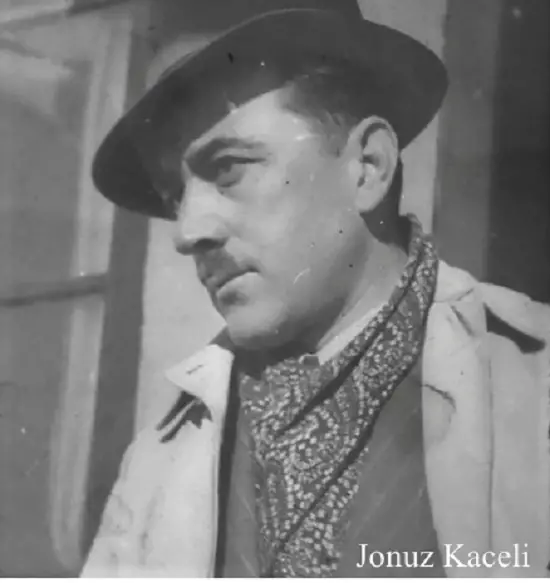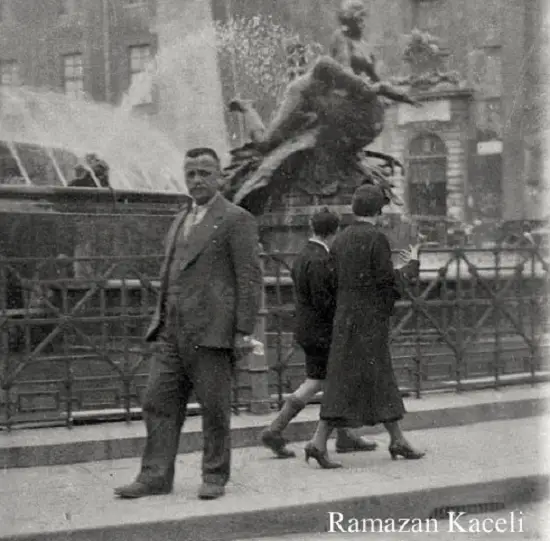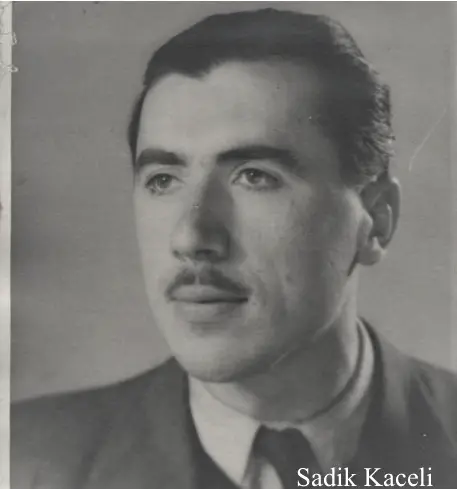By Osman Kaceli
– The rare testimonies of Osman Kaceli, whose father, Jonuz, was shot for the “bomb in the Soviet embassy”, how they faced the suffering during the exile in Skrapar, where his sister, Berina, fell in love with the well-known comedian, Grandmother Vasina, a 20-year-old boy at the time, but…?! –
Memorie.al / It were the night of February 20, 1951. I was 9 years old then. It can be assumed that at that age I could not have read Dante Alighieri. But when I read it, I saw many similarities between his ‘Hell’ and that tone. What about our Nona, the heroine we will talk about in this article, what did she not have the right to grind in her mind…?! Dante himself gave him the right in the famous verses:… “That there is no greater pain / than to remember the happy life / in extreme suffering and misery”. In the days that followed my father’s arrest, well-wishers and family members, as is customary, had been constantly by his side. In those days, various news circulated that, in most cases, conflicted with each other. However, hopes were high and we were all waiting for our father’s release. However, on Tuesday, February 27, when the spoils that our nonna had taken to the new prison of Tirana were returned, we noticed that the empty food pot was so tight with the lid that we had a hard time removing it. He had used a piece of torn cloth. Nona immediately let him know; it was torn from the body shirt he was wearing that pitch-black night, when the executioners violated his nest of family happiness.
It was obvious that he was very embarrassed. Hopes faded; illusions began to fade. On Thursday, March 1, the beasts returned again, but this time with terrible news. Nona almost didn’t hear them, but one word stuck in her mind. That’s how they scolded him and stunned him, he went out to the yard calling: – Lord Hamdi, Lord Hamdi! – She addressed Hamdi Karazi, who at that time lived in Uncle Roma’s house. – What does the word “execution” mean to me? I don’t know exactly what his answer was, but the action I had to perform best explains my troubled state of mind. She somehow wanted to end her life. But fortunately, Prokop Mima’s mother was found who, with the sweetness of the word that characterized her, brought him to consciousness instead, reminding him of the great task that, in addition to coping with the pain, was also raising her 7 children. Let it be implied that these lines that I am writing do not express even one percent of what happened in those moments that would mark the start of that long ordeal…!
At that time I had just passed 9 years old. We were in the big break at the “Ismail Qemali” school where I attended the fourth grade. It was around three-thirty in the afternoon when Nevin approached me – let me tell you, Matt, that in a reprimanding manner he informed me of the incident: – How can you fight with the lions? – he addressed me harshly, as if he was holding my fault. Those days he would turn 13 years old. – Don’t you know that they killed Baba…?! My eyes got dark so that I don’t remember how I left the school and found myself at the gate of the house, on the left side of which was uncle Sadiku who was putting a paper strip on which was written: “WE DO NOT WAIT VISIT”. However, since the news had spread with lightning speed, both the alley of the Quejtun of Kacelve, as well as the courtyard of the house of uncle Roma where we lived for 2 years, was full of people, who will surely have me right to the place where Nona was located.
I don’t remember who was sitting next to her, only that she never leaves my sight and I will never forget her sight. He had a heavy shadow to let me understand that he knew very well the trouble he was dealing with. He looked at me with love and pity but – maybe it seemed to me – also with the conviction that I would always be by his side. Of course my look will have been approving. From that moment I vowed in silence: – I would stay by Nonna’s side for the rest of my life. Grandma, who loved me immensely, must have been nearby. I had the name of my grandfather, Osman Kaceli. The next morning, I walked hand in hand with my older sister, Vera, to the infamous State Security offices. We somehow had to, if not revolt, at least complain. The exalted officers of the State Security and communist functionaries, in addition to the terrible news of the execution of our father, Jonuz Kaceli, had ordered Nona not to move from the house, and with her the seven children. “On Saturday, – they had said -, you will be interned in Tropoja”. We asked to be taken to a closer place, because we had heard that our co-sufferers were destined for Berat, Vlona, Lushnje, etc…!Our complaint fell on deaf ears to almost everyone, when in the end Vera took me by the hand and let me know that the criminals had set their hearts on stone and would deport us to Çorovoda in Skrapar. It was the first time I heard these two place names.
Meanwhile, the enforcement officials also visited the house and carried out the next order: the sequestration and confiscation of all of Baba’s and Nona’s property, except for the spoils of the body. They locked all of these in one of the rooms of the house and in addition to padlocks; they also put red wax with the infamous confiscation seal. On Saturday, March 3, 1951, in the morning around half past eight, the truck on which we were all going to be loaded with the few types of loot was heard entering the alley with noise. In a few minutes and under the supervision of accompanying policemen, these actions were carried out. I don’t know who had taken me out of the place where the confiscated spoils were (probably L. Fezolli who, as someone said, had expressed pity for us), two springs and two small portable beds, which added a little to them the gyanas who were the burden. Together with us, grandmother Zyhra, uncle Liu, Baba’s older brother, who was released from prison a while ago, were living in exile. He was only allowed to accompany us to Skrapar.
When we all got in, and the truck was making the exit maneuver from the alley, I noticed uncle Sadik addressing us with the words: – “Gajret e Sabër”, the meaning of which I found out later: – Strength and Patience. I don’t remember anything else. I don’t even imagine anyone. Uncle Roma was still in prison, and I certainly didn’t mind looking for him in the huge pile before my eyes. Nondaja, Haxhire Katroshi (Tagani) and Grandfather Salih Efendi Tagani, must have been. Finally, the truck started, but to our surprise, it stopped again without reaching the top of the ‘Pine Road’. Together with us, two other families would travel; they were the families of the honorable gentlemen, Manush Peshpia and Reis Selfo, who had suffered the same loss. I don’t remember which way, the family members of the deceased, Anton Delhysa, were also loaded into the said truck with the few loots. Meanwhile, the truck started moving and then sped off in the direction of “Durres Street”. It was freezing cold. We were all huddled through the gaps that allowed the spoils to be loaded into the truck. Everyone tried to cover themselves with something, to avoid this cold to a certain extent, when suddenly it started to rain that didn’t leave any of our bodies without moisture.
In the vicinity of Lushnja, he rested a little, to stop altogether, when we arrived in that city. The family members of the deceased Mr. Reis Selfo. The rest of us continued. As we reached Berat, dusk was falling. The family of the deceased would stop there, Mr. Manush Peshpia and that of the deceased, Anton Delhysa. When we were left alone, we found out that we couldn’t travel anymore with that truck, because the road was narrow and it was too late. Since there was no room for us in the city police, they decided to send us along with the loot to the inn with the same name as the place where we would be interned. Your name is “HAN SCRAPARI”. It was Saturday, shopping day. The inn was extremely dirty and full of lice, fleas and bedbugs. Who knows how difficult it will be for our poor Nona. She was very curious from all points of view.
Early on Monday morning, we started to load the spoils into the truck called “Posta” of Çorovoda, of course we got in as well. This was a small truck, fortunately we covered it that made the Berat-Çorovodë-Berat route 3-4 times a week and served for the transport of mail and passengers. After lunch we arrived at the place we were assigned to live in, that small center. We were placed in an old building that served as a warehouse for police glasses and antiquities. After we spotted a few eyes and the oysters – Vera, Berina and Drita – did as much as they could some pastrami in the little space we had left, we placed the two springs and the other spoils on them. After a while, uncle Liu, who had been sorting out the document problem at the police, came back, and, to our surprise, together with another man – who immediately and with some satisfaction introduced him as his friend. This was Mr. Peter. We would always have this gentleman, Pjeter Deda, by our side for thirty months in a row.
It was very cold. Nona made something like an oven, and with some pieces of coal that we found in the pile of ashes where the prison policemen seemed to be emptying the braziers, she lit a fire that served to warm us up a little, but it seems to me that she cooked something for us right there hangar. Evening was slowly approaching, when I noticed that Mr. Peter. In his hand he had an old cavate which was half filled with the soup that, as he told us, he had for the dinner ration. With the gentile that characterized him, he offered it to us too, but of course, at least for that evening, we didn’t want it. After a while he greeted us and went to his “room” at the mill. Meanwhile, it is understood that night has fallen and you have no choice but to get ready for bed. We settled down somehow. I guess the layers and blankets we were allowed to take were cold, but at least they were clean, so with the warmth that was generated by this crowd, I must have found some kind of comfort and that’s how I’ll be fell asleep immediately…!
At dawn, we all lay motionless from the bed, barely uttering any words. Both Nona and Kanna had tears in their eyes and tried to hide them from each other. Vera stood up first. She reminded us of what they had said to the police yesterday. We would not have guaranteed food like Mr. Peter; we had to provide it ourselves. So Vera and Berina, respectively 16 and a half years old and 15 years old, would work together with Nona in construction, Drita and I would continue school; 6-year-old Miri, with Laska and Dhuri, the 3-year-old twins, would stay with Kanna in what we should call our apartment. Nana Kanna, 76 years old, was a great lady with a special personality. It was as good as it gets. Her smile was lively, natural, and for the way we were brought up, necessary, in these difficult moments. There were trials and other pains and desolate grandmother. There was the death of her only brother, that of her husband, and moreover that of her son Xhaj Ismaili, who passed away at the age of thirty-eight, without leaving at least one child to inherit. So she was also allowed to cry with voice, for which she had fallen me, tested until then. But the last thing that looked like it didn’t matter to you.
The loss of Baba was deeply felt in his soul. “- This of Nuzi burned my soul” – she repeated from time to time when she cried and felt sad. – “We all avenge death, but in the natural way as the great God wants”! Her tears flowed unceasingly, and her handkerchief, her mind, as she called it, was always sticky, no matter how often Nona washed and dried it. And again, she still gave us hope and faith. She stayed with us in exile for 9 months. The extremely difficult conditions further worsened his health. Well, uncle Liu decided to take it with him, after one of the many visits he made to us without interruption during the entire period of exile. We missed her very much, especially Nona, who always found her blessings. They both had an exemplary relationship and mutually encouraged each other.
Nona, however, faced it like a woman. Although we were not surrounded by barbed wire, we were completely cut off from all views. This is how Nona spent her life. It was a large cleaner and everything sparkled when it fell into her hand. He served us with a special devotion. He took care of the healthy growth, especially of Laska and Dhuri, who were very small. With extraordinary care, in the complete absence of drugs and medical medications, she treated and cured two 3-and-a-half-year-old girls from chicken pox, which almost left them blind. She also took special care of 6-year-old Mir, who had suffered a deep shock, without neglecting the care of us adults. Nona knew very well the great fatigue of Vera and Berina in the odd side jobs where they worked, because she had experienced the desert herself.
She worked for five or six months together with him until she was torn in the middle by a severe spondelio-arthrosis of the spine. Despite the pains of this disease, our lonely Nona did not complain at all. It took the brave intervention of a good and quite humanitarian doctor, who saved him from forced labor and eased his pain with a few injections. His name was Ihsan Çabej, this wonderful man who would meet us and help us in many similar cases and not. So Nona did not go to work, all the time she bought everything necessary for living or daily survival. Cleaning and hygiene as the main condition for maintaining health as she knew, but also as Baba ordered every day during his life. I emphasized hygiene because I am sure that even the most observant people who will read these few lines have not yet thought of asking, where and in what way; (this time I do not intend to tell a story such) we carried out personal needs.
For other work such as cooking, patching the work clothes of the oysters (this work “eats the clothes with my feet”, repeated Nona, time and time again), and everything else she called and performed as an art in itself. So Vera e Berina tried to make the environment where we were forced to live as comfortable as possible. Likewise for ME and Drita, when he prepared us for school every morning. Luckily for both of us, the law of the school was known to us. While later when Drita finished her seven-year internment in the first year, we with the help of Mr. Pjetri, we addressed a prayer to the police, so that she could continue her secondary education in Tirana, near her relatives. (Skrapari did not have such a school…!). The request was rejected, almost without consideration at all. From that moment on, she was tasked with supplying the house with water and wood. Until that time, I was not privileged.
My only duty was teaching at school. I was very small in body and remained so for a long time. I don’t know what phenomenon it is or how it is explained, but in my subconscious I have called myself much bigger than I really was, without having the ability to make it clear to others. It seems to me that Nona understood this tendency, which I have been trying to manifest with positive actions all my life. Well, although it was not my duty, I tried to help Nona and through her the sisters in all directions. I carried water that we got from a stream that flowed rapidly two or three hundred meters near us, I cut wood in the forest and carried it on my back along with Light. At school, I have very good results, which pleased Nona and the others. The elementary school teacher Polizoi Gjika, and later those of the seven-year-old, Selim Gjeli, Mustafa Janina, Niazi Petrela, Liri Mehqemeja and Parashqevi Sahatçi, told her these results, with the kindness and certainty that Nona would have liked. I personally had the great pleasure of having these wonderful teachers. Of course, you need a little preparation, but not much.
And so the days passed, and exactly after a little more than a year in internment, there was a significant quantitative change, so to speak, in terms of the number of internees. There, around March 15, 1952, came some internees from the infamous Tepelena camp, who was installed in Skrapar. There were 57 men, who, as it turned out later, were the most, one better than the other. But among the names I have in mind, the Catholic priest, Dom Nikollë Mazrreku, stood out to me. I can say for sure that I, without realizing it, have tried to resemble him in general terms. From the beginning, he came very close to us and clearly manifested both his sympathy towards us and his extreme regret for the tragic event that had happened to our Baba and his family. As a priest on the one hand, but also as a very cultured, positive and optimistic person on the other hand, he did his best to relieve us of the great pain that the communist criminals had caused us, with their arrogant and barbaric behavior. And especially for Alaska and Dhuri, he had a special love, and often told very beautiful fairy tales and stories. Apart from what he tried to invent all kinds of games with the circumstantial means he had at his disposal. So he was also an excellent craftsman. Besides him, Fatbardh Kupi, Valentin Pervizi, etc., etc. also came to Çorovode. But the one who remained not only in our memory, was Gjovalin Vasija.
He was a young man of about 20 years old, who demonstrated a special vitality and dexterity. He had a cheerful nature and at first glance gave the impression of a man gifted with humor. The chance gave him to enter our lives once and for all…! Between him and Berina, a love idyll was born that remained so even to this day. I found out about this by chance when I overheard a conversation between Nona and Berina, in which the latter was explaining to Nona, in very sarcastic words, what she was doing in her life. And while she was talking, she tried to fill Nona’s mind, to help her in some way or as they said to give some consent. As she spoke, her eyes were filled with tears, even the gentle fairy of prayer. I didn’t hear what Nona said to him, but I only saw her approach him and caress him warmly. September 1951 was approaching. I was going to the fifth grade, while Miri was going to start the first grade. But he didn’t like us or want us. He always wanted to stay close to Nona and as they say: “he had no eyes for the qabah”. The sadness of that night of February 20 had its effect. Fortunately, my former teacher Polizoi came very close to him, who showed himself this time again what a kind and generous man he was. He made Mir not only to go, but also to learn better than others. I remember another incident in those days: When Uncle Liu came, apart from the food items he usually brought us such as pasta, oil, sugar, etc., he also brought a sealed package, which immediately piqued our curiosity.
– Joy was in Moscow – he explained to us, while opening it. – There he met Nuzi’s friend, Tuk Jakov – he continued, trying to contain his emotions, without succeeding in stopping Nona’s sobs and Cannes, who cried softly. Meanwhile, the package was opened and we were very happy about the items that made up it. There was a pair of overalls, a pair of black rubber boots with fluff inside, a beautiful ball of elastic, candy, and some other thing that I didn’t remember. – Tuku – uncle began to speak again – he had expressed his deep regret to Gezimi, for the great misfortune, expressing his highest considerations for your father. He had also heard about Mir’s sadness, at the time of his arrest, and together with him, he had bought these jeans in a store in Moscow. “A little something for the boy”, he said while Gezimi thanked him.
Meanwhile, Miri and I had gone out to a small square nearby and started playing with the beautiful ball, arousing the curiosity of some local children who were watching us from afar. Miri even put on her boots right away, so this event became an additional motive for me to go to school willingly. Uncle Liu also made for Vera and Berina 2-3 pairs of rubber o-rings from those that were sold to each other, a couple of dock jacks for work, etc.
I remember one of the days we had a break at school. I decided to go with them and my sisters helped me. The deserters were extracting large stones from the Vlushë River, which they had to collect in stacks of about 1 meter height, so that the length directly determined the volume in cubic meters. The rate was very high. I started to help them. Vera and I took the stones from the river to the shore. Berina broke them with hangers and stacked them. The stones were smooth from rubbing against each other. I could barely hold them with my rather small fingers and they often slipped. Vlusha was a precipitous torrent that flowed from the mountain of Tomorrica. The razor cold water had an effect on my legs after about 2 hours.
They were filled with bubbles of the same type as those formed by burning. I saw them, but I didn’t want to paint myself. Since they were bothering me, of course I must have given some sign, that both of them started calling me to leave work because I was tired. But when they saw the bubbles, they were very preoccupied and immediately pulled me to the shore and the nations gathered me with their headscarves to warm me up a little. The lunch break was approaching, and the foreman gave permission to accompany me home. They explained to Nona, who took me by the hand and told me to put the medicine on me. I have forgotten how long it took to get over this worry, but I will never forget how tired those lonely sisters were in that arduous work. Fortunately, when a new hotel with eight rooms on two floors began to be built, a different kind of stone was needed, which was cut from the quarry. They started working in construction, where the work was hard, but at least it didn’t have the effect of humidity, as a result of which Nonna’s spondelio-arthrosis, Berina’s, caused constant back pain from rheumatism, and great fatigue.
Days and months passed. Well, they changed our apartment in Nandor. When a car with windows arrived, we were forced to release it and lift the loot, to take shelter in an alcove next to the prison. It had served as a pigsty that the policemen had as an auxiliary economy. You can guess what work Nona had to clean and whitewash that new apartment. I found the lime in a pit that was used for its multiplication, which was near the river. Of course, it took the help of the oysters to finish cleaning and organizing the spoils. The first night we hardly slept at all. Some pasture and some smell of pigs played the role in this direction. However, we quickly got used to the new situation. Meanwhile, I turned 10 years old with 6 November, and Nona prepared something for us to “celebrate”. Mr. Pjetri also came, who even gave me his ration of fish pasta. After three days it was Miri’s birthday. Luckily, Aunt Bakushi came with Shyqyri that day, and so something more than usual was laid on the mahogany. The aunt could not believe her eyes for what shift. Only once did my aunt cry when she saw where the children of Jonuz Kaceli, her former brother-in-law, were forced to spend the whole day. Aunt stayed only three days, but for us it was a great joy. Memorie.al










![“In an attempt to rescue one another, 10 workers were poisoned, but besides the brigadier, [another] 6 also died…”/ The secret document of June 11, 1979, is revealed, regarding the deaths of 6 employees at the Metallurgy Plant.](https://memorie.al/wp-content/uploads/2026/02/maxresdefault-350x250.jpg)





